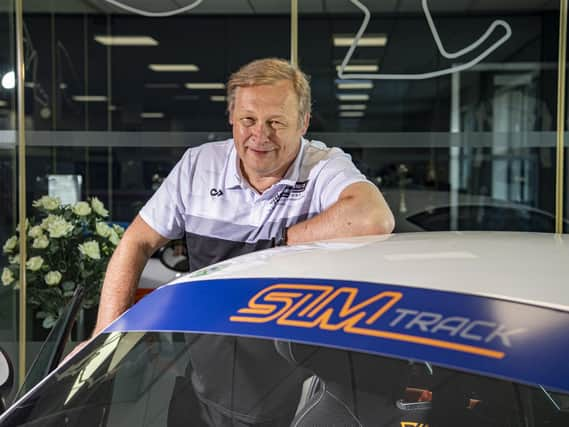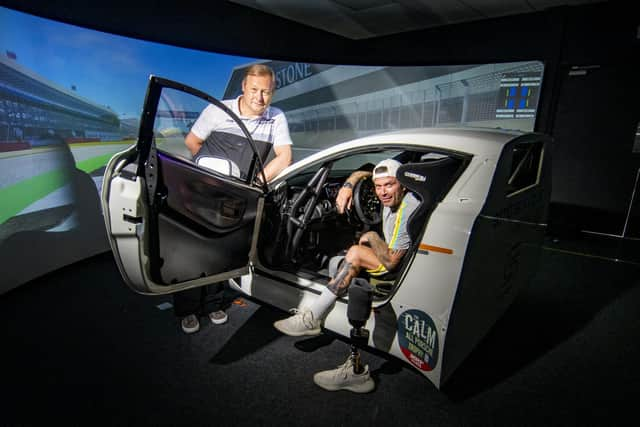How devastating stroke at 31 inspired Gary Booth to provide motorsports experiences for disabled people


Gary Booth knows all too well how tough it can be to come from a life-changing experience – and how it affects the way others perceive you.
The Yorkshireman runs a community interest company called Chequered Flag Motorsport based in Pontefract which runs motorsport-themed events for disabled people – and has ambitious plans to enter a team in a 24-hour endurance race at Silverstone next year.
Advertisement
Hide AdAdvertisement
Hide Ad“We are representing people used to being told ‘no’,” he explains.


It is something Booth has very personal experience of. Back in 1994 and then a young father with his family and a successful job, he suffered a stroke which completely upended his life.
“At the time I was at home with my young toddler and we were playing,” he explains. “It was late October and the sun was low through the window. I started to get a headache and I thought it was from the sun. The next thing I remember is my parents standing over me as I was coming round.”
Booth, who is now 58, adds it was discovered he had suffered a haemorrhagic stroke as a result of a blood vessel rupture in his brain.
Advertisement
Hide AdAdvertisement
Hide Ad“I had my stroke when I was 31 in 1994. I was a fit, healthy young individual and it came completely out of the blue. It left me paralysed and unable to walk at the time.
“I was working in central government in London, I had a good career. It took two years to make what they called a full recovery. Something that people don’t really understand is the mental impact of having a stroke.
“In that two years I lost everything – my home, family and marriage. I had to start again from scratch. I returned to Yorkshire at that point but I found it really difficult to establish a career.
“Because of my stroke experience I had a desire to do some fundraising but I’m not really the adventurous sort and didn’t really want to throw myself out of a plane or anything like that.”
Advertisement
Hide AdAdvertisement
Hide AdHis opportunity came recently after leaving his job in 2019 and having some time on his hands. Booth ended up working with the Sheffield-based Paces charity, which supports individuals with cerebral palsy and motor disorders, and developed a racing simulator experience for service users to try.
“We developed simulator experiences called Paces Races. That is how the whole thing started.”
Booth purchased a high-end racing simulator and says he was pleased other good causes also started showing an interest in using it.
“Other charities saw what I was doing and asked if I could do something similar for them,” he says.
Advertisement
Hide AdAdvertisement
Hide Ad“When we first started doing it, we didn’t know whether there would be any interest. But charities looked at it and thought it was great.”
After working with groups like Dementia UK and Support Dogs, Booth also got involved in supporting a group of amputees who include among their number Halifax’s Ben Lovell who lost half his right leg in 2017 after suffering a blood clot.
“I got involved with a group of amputees whose drive and determination and refusal to quit just blew me away,” says Booth.
Chequered Flag Motorsport was registered as a community interest company last year with a focus on providing events and experiences for people classed as non neuro diverse, disabled and less privileged.
Advertisement
Hide AdAdvertisement
Hide AdBooth has developed a tier system of possible motorsport-themed experiences – from Formula 1 factory tours to circuit track days and the motorsport simulator.
The most ambitious idea in the offing is the creation of a ‘‘scholarship programme’’ in which people will get a chance to be part of a small team that hopes to participate in a C1 Racing Club 24-hour event at Silverstone next year in a specially-adapted car.
“We will buy a C1, then have it refitted so people with disabilities are able to drive it,” Booth explains.
“Unlike traditional racing teams our focus won’t really be on winning – our aim is about giving people the chance to experience motorsport in a way they wouldn’t have otherwise had the opportunity to. To be in a position to offer something like this is wonderful.”
Advertisement
Hide AdAdvertisement
Hide AdBooth says that his own experiences in life means that he knows how tough it can be to be judged as not capable of doing certain things with the stroke he suffered still having an impact on his life decades on through issues like fatigue.
“What I say to people is that if you have a condition that kills brain cells, it is bound to have some long-term effects,” he says.
“The frustration is people will look at me and I am 90 to 95 per cent physically recovered and think I am ok. But then the expectation is that I’m going to do normal things and act in a normal way – sometimes I’m not able to do that.”
He says he hopes his organisation can play a part in redressing the balance and providing some positive and unique experiences for people in a way that takes accounts of their challenges but also their potential.
Advertisement
Hide AdAdvertisement
Hide Ad“It is very difficult for somebody to feel that anybody else understands and that is where a lot of frustration comes from,” he says. “My experience is not the same as losing a limb but the after-effects and the impact on your life and your family is something I can relate to. It is very easy to sit back and feel sorry for yourself, we are all guilty of that. But this is about not giving up and having drive and determination. If people can see somebody else has done something then other people can think, why can’t I do it too?”
Support for Leeds centre
Gary Booth has praised the support of the SimTrack Driver Performance Centre in Leeds where some of his organisation’s events takes place.
He says it was a visit to their centre which sparked the idea for his organisation.
"SimTrack were the inspiration for me using motorsports in this way and they have been great supporters of what I have been doing.”
Advertisement
Hide AdAdvertisement
Hide AdThe company recently updated its mission statement to be about helping “those who are not given the same opportunities as neurotypical, non-disabled or otherwise privileged individuals when it comes to participation in motorsport”.
Visit https://chequeredflagmotorsport.uk for more information.
Support The Yorkshire Post and become a subscriber today. Your subscription will help us to continue to bring quality news to the people of Yorkshire. In return, you'll see fewer ads on site, get free access to our app and receive exclusive members-only offers. Click here to subscribe.